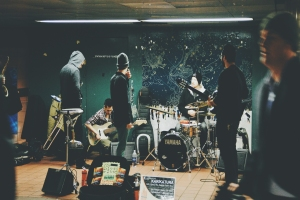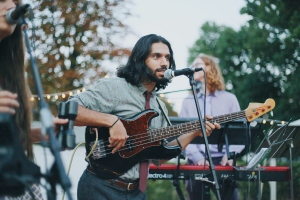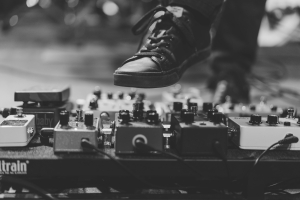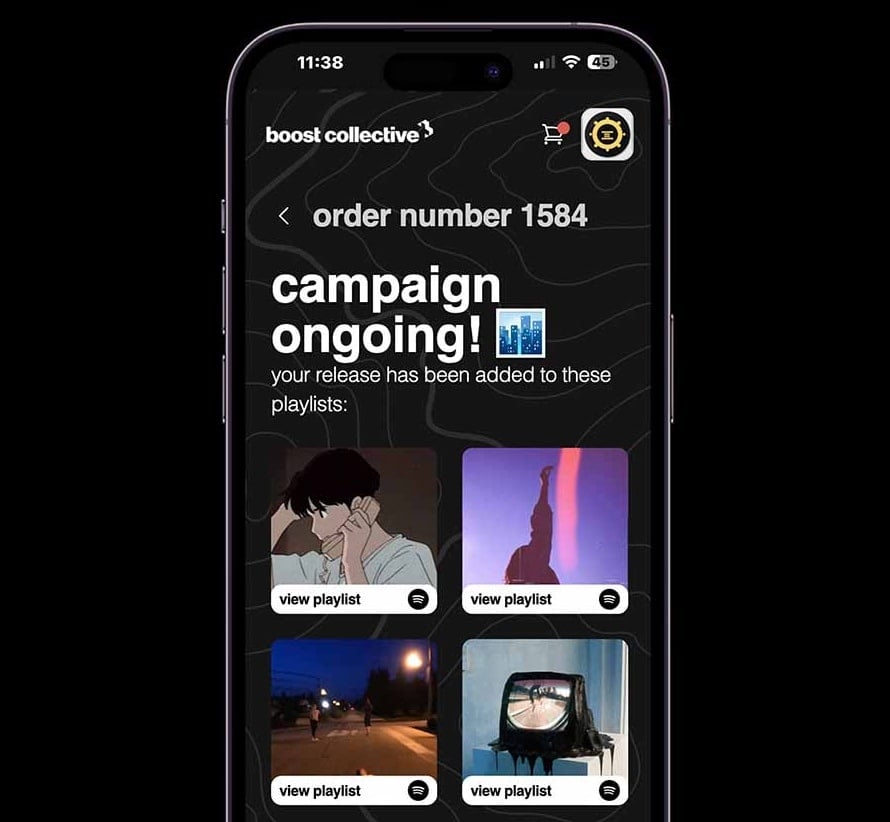Overview
Are you an aspiring musician struggling to gain a following?
Don't let the lack of a fanbase discourage you.
With the right strategies and mindset, you can still effectively promote your music, even just you, with no followers.

Introduction
The live music show industry is highly competitive, and breaking through can be challenging, especially if you don't have a large following.
However, many successful musicians started from scratch and built their careers from the ground up.
It's all about finding creative ways to get your music out there and connect with potential fans.
Promoting your music online, without any followers may seem daunting, but it is not impossible.
In fact, this can be an opportunity to experiment, think outside the box, and develop a strong foundation for your music career.
In this feature, we will explore various strategies and music promotion tips and tactics that can help you effectively promote your music, even if you have no followers.
So, listen and if you're ready to take your music to the next level, keep reading!
The Challenge
Promoting music with no followers can be a daunting task, but it's not impossible.
It requires dedication, creativity, and persistence.
Here are some strategies to help you get started:
-
Create High-Quality Content: Focus on creating exceptional music that stands out. Spend time refining your sound, lyrics, and overall production quality. Your music should be a reflection of your unique style and passion.
-
Identify Your Target Audience: Determine the demographic and genre that aligns with your music. Understanding your potential audience will help you tailor your promotional efforts more effectively.
-
Utilize Social Media: Even if you start with no followers, social media platforms are essential for gaining exposure. Create profiles on platforms like Instagram, Facebook, Twitter, and TikTok. Share behind-the-scenes content, teasers, and engaging posts to attract new followers.
-
Collaborate with Others: Look for opportunities to collaborate with other musicians, artists, or content creators who have a larger following than you. Their audience may discover your music through these collaborations.
-
Network and Engage: Attend local events, open mics, and music industry gatherings to meet other musicians and potential fans. Engage with people who show interest in your music both online and offline.
-
Submit to Music Blogs and Playlists: Send your music to relevant music blogs, online magazines, and playlists that feature independent artists. Getting featured in these platforms can introduce your music to a wider audience.
-
Utilize YouTube and Streaming Platforms: Create visually appealing music videos for your songs and upload them to YouTube. Additionally, distribute your music on streaming platforms like Spotify, Apple Music, and SoundCloud.
-
Start a Blog or Vlog: Share your journey as an artist through a blog or vlog. Document your creative process, challenges, and successes. This personal touch can help connect with potential fans on a deeper level.
-
Organize Local Gigs: Perform at local venues and events to showcase your talent. Engaging with a live audience can help you build a local fanbase.
-
Run Contests and Giveaways: Organize online contests or giveaways that require participants to engage with your music or social media profiles. This can help create a buzz around your music and attract new followers.
-
Reach Out to Online Communities: Find online forums, subreddits, and Facebook groups dedicated to music and share your work there. However, avoid spamming or being too promotional; instead, engage in genuine conversations and let your music speak for itself.
-
Stay Consistent: Building a following takes time, so be patient and consistent in your efforts. Continue to produce great music and promote it actively.

Importance Of Promoting Music Independently
Promoting music independently can be of significant importance for artists, especially in today's digital age world.
Here are some key reasons why promoting music independently can be advantageous:
Creative Control
When promoting music independently, artists have complete creative control over their work. They can experiment with their sound, lyrics, and overall artistic expression without external pressures or interference from a record label or management. This freedom allows artists to stay true to their vision and produce music that resonates with their authentic voices.
Flexibility And Autonomy
Independent artists have the flexibility to make decisions on their terms. They can choose when to release their music, collaborate with other artists, or explore different genres. This autonomy extends beyond the creative and recording process, to decisions about marketing strategies, concert tours, and merchandise.
Direct Fan Engagement
Independent musicians often have a closer and more personal relationship with their fans. Without the buffer of a record label, artists can directly engage with their audience through social media, live shows record videos, and other platforms. This direct connection fosters a dedicated and loyal fan base, which can be instrumental in building a sustainable music career.
Revenue And Royalties
While major record labels may offer substantial financial backing, they also take a significant portion of an artist's earnings. In contrast, independent artists can retain a more substantial share of their revenue, including earnings from album sales, streaming platforms, merchandise, and ticket sales. This financial independence can provide a stable income and allow artists to invest in their future projects.
Niche Markets And Artistic Freedom
Independent artists can cater to specific niche markets and experimental genres that might not fit the mainstream industry's mold. By promoting music independently, artists can explore and create music that might be considered unconventional but resonate deeply with a dedicated audience.
Portfolio Building
Independent musicians can build a diverse portfolio of work, which can be crucial in establishing a unique brand identity all the difference. This versatility can lead to opportunities in sync licensing (placing music in films, TV shows, and commercials), collaborations with other artists, and other projects outside of traditional album releases.
Adaptability And Agility
The music industry is constantly evolving, and trends can change rapidly. Independent artists can respond more quickly to market shifts and adapt their promotional strategies accordingly. They are not bound by long-term contracts and can seize emerging opportunities as they arise.
Build A Strong Online Presence
Building a strong online presence is crucial for music promotion in the digital age.
With a well-executed music journalism strategy, you can reach a larger audience, engage with fans, and increase your chances of success. Here are some steps to help you build a robust online presence for music promotion:
-
Create a Professional Website: Start by building a professional website. This will serve as your central hub for all things related to your music. Include an attractive design, a bio, links to your music and social media profiles, upcoming shows, and a mailing list signup form.
-
Leverage Social Media: Use social media platforms like Facebook, Instagram, Twitter, and YouTube to connect with your audience. Post regularly with engaging content such as music snippets, behind-the-scenes videos, live performances, and interactions with fans.
-
Utilize Streaming Platforms: Upload your music to popular streaming platforms like Spotify, Apple Music, SoundCloud, and Bandcamp. These platforms are essential for reaching a wider audience and gaining new fans.
-
Create Engaging Content: Besides your music, create various types of content, including music videos, lyric videos, vlogs, and Q&A sessions. High-quality and engaging content will attract more viewers and followers.
-
Collaborate with Influencers and Bloggers: Partner with influencers, bloggers, and music curators in your genre. Their support and promotion can introduce your music to their existing audiences and give you a broader reach.
-
Host Virtual Concerts and Livestreams: Organize live virtual concerts and Q&A sessions through platforms like Twitch, Instagram Live, or YouTube Live. Engaging with your audience in real-time can strengthen your connection with fans.
-
Offer Freebies and Exclusives: Encourage fans to join your mailing list by offering free downloads, exclusive content, or early access to new releases. This helps you build a dedicated fan base and keeps them informed about your latest updates.
-
Use Email Marketing: Build and maintain an email list to keep your fans updated on new releases, upcoming shows, and other important news. Email marketing remains a powerful tool for engaging with your audience directly.
-
Optimize for Search Engines (SEO): Ensure your website and content are optimized for search engines, so people can easily find you when searching for relevant keywords related to your music.
-
Engage with Your Audience: Interact with your fans regularly by responding to comments, messages, and mentions. Building a strong connection with your audience fosters loyalty and encourages them to support you further.
-
Run Contests and Giveaways: Organize online contests or giveaways to generate excitement and encourage people to share your music with their friends and followers.
-
Network with Other Musicians and Industry Professionals: Connect with other musicians, producers, and industry professionals in your niche. Collaborating and networking can open up new opportunities for exposure and growth.
-
Stay Consistent: Building a strong online presence takes time and consistency. Keep posting content regularly, engaging with your audience, and adapting your strategy based on what works best.

Utilize Free Music Platforms
Promoting your music on free music platforms can be an excellent way to reach a wider audience and build your fan base. Here are some strategies to effectively utilize free music platforms for music promotion:
-
Create High-Quality Music: Before promoting your music, ensure that it is of high quality. Take the time to produce well-recorded, mixed, and mastered tracks. First impressions matter, so make sure your music stands out.
-
Choose the Right Platforms: There are various free music platforms available, each with its own unique features and audience. Some popular ones include SoundCloud, Bandcamp, YouTube, and Audiomack. Research and select the platforms that align best with your genre and target audience.
-
Optimize Your Profiles: Set up artist profiles on each platform with compelling bios, attractive profile images, and links to your social media or website. Consistent branding across platforms helps you establish a recognizable identity.
-
Regularly Upload New Content: Keep your profiles active by consistently uploading new music. Whether it's singles, EPs, or albums, regular content updates will keep your audience engaged and coming back for more.
-
Leverage Social Media: While the music platforms themselves are crucial, don't underestimate the power of social media. Share your music on platforms like Instagram, Twitter, and Facebook to reach a broader audience.
-
Collaborate with Other Artists: Collaborating with other artists, especially those with larger followings, can expose your music to their fan base and vice versa. Cross-promotion is an effective way to expand your reach.
-
Use Tags and Descriptions Wisely: When uploading your music, use relevant tags and descriptions to make it easier for users to discover your content through searches and recommendations.
-
Engage with Your Audience: Respond to comments, messages, and feedback from your listeners. Building a strong connection with your audience can lead to more loyal fans and word-of-mouth promotion.
-
Participate in Music Communities: Join online forums, music groups, and communities related to your genre. Engage in discussions, share your music, and support other artists. Networking within these communities can lead to valuable opportunities.
-
Utilize Creative Commons Licensing: If you're comfortable with it, consider using Creative Commons licenses for your music. This can allow others to use your music in their projects while giving you proper attribution. This can help your music spread further and gain exposure.
-
Monitor Analytics: Most free music platforms offer some level of analytics. Keep an eye on these insights to understand how your audience is interacting with your music and adjust your promotion strategies accordingly.
-
Utilize Playlists and Curators: Submit your music to relevant playlists and reach out to playlist curators on these platforms. Being featured on popular playlists can significantly boost your visibility.
Collaborate With Other Artists And Influencers
Collaborating with other artists and influencers for music promotion can be a powerful way to expand your reach, gain new fans, and increase your exposure.
Here are some steps to help you successfully collaborate with others:
-
Define your goals: Before reaching out to potential collaborators, clarify your objectives. Determine what you hope to achieve through the collaboration. Whether it's increasing your fan base, reaching a new audience, or enhancing your artistic reputation, having clear goals will guide your approach.
-
Identify potential collaborators: Look for artists and influencers whose style and audience align with yours. Seek out musicians with complementary genres or a similar target audience. Additionally, consider influencers whose followers may have an interest in your music.
-
Start building relationships: Begin by engaging with potential collaborators on social media or attending their events. Show genuine interest in their work, comment on their posts, and share their content when appropriate. Building a relationship before making a collaboration proposal increases the chances of a positive response.
-
Craft a compelling proposal: When approaching artists or influencers for collaboration, personalize your outreach. Explain why you believe the collaboration would be beneficial for both parties and their audiences. Emphasize the unique value you bring to the table and how it aligns with their brand.
-
Collaborate on content creation: Work together on creating content that promotes your music and resonates with both of your audiences. This could include co-writing a song, producing a music video together, or recording a live performance.
-
Leverage social media and online platforms: Use various social media channels and platforms to promote the collaboration. Coordinate your promotional efforts and encourage your fans to check out the collaborator's work, and vice versa.
-
Host joint events or performances: Organize joint concerts, live streams, or virtual events to showcase the collaboration. This can help cross-pollinate your audiences and create a memorable experience for both sets of fans.
-
Utilize influencers' platforms: If you're collaborating with influencers, consider having them feature your music on their channels. They can create dedicated posts, videos, or stories about your collaboration, introducing your music to their followers.
-
Measure and track results: Keep an eye on metrics such as streaming numbers, social media engagement, and follower growth to evaluate the impact of the collaboration. Assess whether your goals were met and identify areas for improvement in future collaborations.
-
Continue nurturing relationships: After the collaboration, maintain the relationship with your collaborators and stay engaged with their content. Building lasting connections can lead to more opportunities in the future.

Engage With Music Bloggers And Online Media
Engaging with music bloggers and online social media sites is an excellent strategy for promoting your music and reaching a wider audience.
Here are some steps to effectively engage with music bloggers and online social media platforms reward used for music promotion:
-
Research and Identify Relevant Blogs and Online Media: Start by researching music blogs and online platforms that align with your music genre and target audience. Look for blogs that have a substantial readership and a history of covering artists similar to your style.
-
Personalize Your Approach: Avoid sending generic mass emails to bloggers. Take the time to personalize your pitch to each blogger or media outlet. Mention something specific about their previous work or articles that resonated with you. It shows that you have done your research and are genuinely interested in their platform.
-
Craft an Engaging Press Release: Prepare a well-written and concise press release that highlights the key points about your music, such as your background, recent releases, upcoming projects, and any notable achievements. Include links to your music, videos, social media, and website. Make sure the press release is in a format that's easy to read and understand.
-
Follow Submission Guidelines: Some bloggers and media outlets may have specific submission guidelines or requirements for music promotion. Follow these guidelines carefully to increase your chances of being featured.
-
Build Relationships: Building relationships with bloggers and online media is essential for long-term success. Engage with them on social media, share their content, and show genuine support for their work. Building a positive relationship can lead to more coverage in the future.
-
Offer Exclusive Content: Consider offering exclusive content, such as a pre-release of a new song, an interview, or behind-the-scenes footage, to the bloggers you are reaching out to. This gives them a unique angle to write about and can increase their interest in covering your music.
-
Be Professional and Polite: Always maintain a professional and polite tone in your communications. Remember that bloggers and media outlets receive numerous pitches daily, so be respectful of their time and response.
-
Track Your Outreach: Keep track of the blogs and media outlets you've contacted, the dates you reached out, and their responses. This information will help you follow up appropriately and evaluate the effectiveness of your outreach strategy.
-
Utilize Social Media: Engage with bloggers and media outlets on social media platforms where they are active. Share their articles and tag them when appropriate. Social media interactions can help strengthen your relationship and keep you on their radar.
-
Follow Up: If you don't receive a response initially, consider sending a follow-up email after a reasonable amount of time has passed. However, don't be too pushy or aggressive in your follow-ups.
Offer Free Downloads And Limited-Time Promotions
Promotions, especially those involving free downloads and limited-time offers of favorite songs, can be effective strategies to promote music and attract new fans.
Here are some steps and tips to help you execute a successful music promotion campaign:
-
Choose The Right Platform: Identify the platforms where you want to offer your free downloads and promotions. Popular choices include your official website, SoundCloud, Bandcamp, and social media platforms like Facebook, Twitter, and Instagram.
-
Create Compelling Content: Ensure that you have high-quality music that resonates with your target audience. Whether it's a single, EP, or album, the content should be engaging and showcase your unique style.
-
Set Clear Goals: Define what you want to achieve with the promotion. It could be increasing your fan base, gaining more social media followers, boosting streams, or simply creating buzz around your music.
-
Establish A Timeline: Decide on the duration of the promotion. Limited-time offers create a sense of urgency and can prompt people to take action quickly.
-
Create Eye-Catching Graphics: Design attractive promotional materials such as album artwork, social media posts, and banners that highlight the free download or limited-time offer.
-
Leverage Social Media: Utilize your social media channels to announce the promotion and reach a wider audience. Use relevant hashtags and encourage your followers to share the news.
-
Collaborate With Influencers: Partner with influencers, bloggers, or music reviewers who have a substantial following in your genre. They can help promote your music to a broader audience.
-
Encourage Fan Engagement: Engage with your fans during the promotion. Respond to comments, messages, and feedback promptly to foster a sense of community and appreciation.
-
Collect Email Addresses: Offer a free download or limited-time promotion in exchange for email subscriptions. Building an email list allows you to reach out to your fans directly in the future.
-
Monitor Results: Keep track of the metrics during the promotion, such as the number of downloads, streams, website visits, and social media engagement. Analyze the data to understand what worked well and what could be improved.
-
Follow Up: After the promotion ends, continue engaging with your new fans. Keep them updated on future releases, events, and other exciting news.

The Wrap-Up
Remember, building a following takes time and effort.
Stay consistent, continue to improve your craft, and never give up.
With perseverance and a strategic approach, you can promote your music and gain new followers, even if you're starting from scratch.
